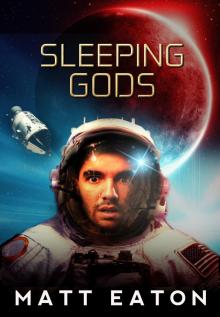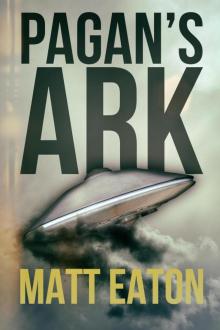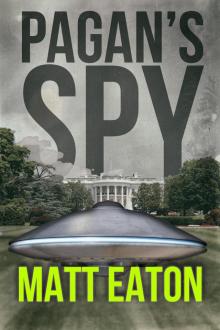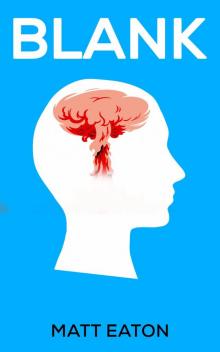- Home
- Matt Eaton
Pagan's Ark Page 3
Pagan's Ark Read online
Page 3
Donovan had known the Pope would join them for the ceremonial handover, but even so when the side doors to Nogara’s office burst open and he found himself face-to-face with Pius XII it came as a surprise. It was like meeting a famous actor or a favorite musician; Donovan felt himself privileged to be in the holy man’s presence. He rose to his feet to greet the Pontiff. He was significantly taller than Donovan who, at five foot seven, was no midget. Though stick thin and dressed unceremoniously in plain white, his stature and his pallid complexion lent Pius a powerful air of authority and a heightened sense of Godliness. Donovan gazed up momentarily into the Pontiff’s pale face and felt captured by his penetrating eyes, before bowing his head as the Holy Father proffered the papal ring.
“William, I am so glad to see you again,” the Pope declared enthusiastically in his rich Roman accent. “I hope I haven’t disturbed your business with Bernardino.”
“Not at all, Holy Father, not at all,” said Donovan.
“We were just wrapping up, Your Holiness,” Nogara confirmed.
Donovan said, “It is wonderful to see you again.”
The Pope smiled and nodded; he knew this to be so. “Bernardino tells me your government is helping us most generously. I have no doubt this is, in no small part, your doing. You are a good man, William. A good Catholic.”
Donovan smiled, touched by the compliment. “It has been my pleasure to serve, Holy Father.”
“I’m running late as usual,” said Pius. “But you are joining us for dinner, I trust?”
“Why of course — I’d be honored.”
“Excellent.”
He was gone a moment later, and Donovan couldn’t help but smile in satisfaction. With Pius now gone, it felt like all energy had been sucked from the room.
CHAPTER 4
Donovan and Nogara were seated opposite one another with the Pope at the head of the table in the Holy Father’s private dining room. The large table had been set for intimacy but the dining room itself was as large as many of Donovan’s favorite New York restaurants, the walls lined with ornate wooden cabinets and exquisite marble sculptures. A litany of servants kept bringing wine and food to the table. None tarried. They were a well-oiled machine of efficiency.
The golden cutlery was polished to such perfection that reflected light flashed around the room as they wielded their knives upon the courses that arrived one after another on pure white bone china plates. A starter of the most delicious spaghetti carbonara was followed up with a divine and succulent serve of chicken Milano. The wine, a 1938 Chateauneuf du Pape, truly tasted like nectar of the gods, Donovan mused. It was full-bodied and smooth, each mouthful more enticing than the last. As soon as the plates were cleared, a sumptuous cheese platter was laid before them, bedecked with grapes and figs and followed with their choice of liqueur.
A man of devout faith and a trustworthy servant of Catholicism, Donovan felt in this moment rather like he had already died and gone to heaven. There was much that had passed between the man and his church that might be called disagreement, but this was to be expected in any impassioned relationship.
Donovan had heard unsettling stories about Pope Pius: that he was a Jew hater, and that he had turned a blind eye to the Holocaust. The stories were deeply disturbing for any devout Catholic who must likewise bow to his Pope’s self-declared infallibility. Donovan rationalized this in his own mind by reasoning that Pius was not yet risen to infallibility when he began his dance with the devil in Berlin in 1933. Known then as Cardinal Eugenio Pacelli he had, on behalf of Pius XI, signed the infamous Reich Concordat with the new German chancellor, which imposed new Canon Law on German Catholics. The Vatican had seen this as a victory for the church, but Hitler was the real winner in that deal. It demanded silence from the church on matters of German politics, which included Hitler’s Final Solution.
Time and again, American envoys had pleaded with Pius XII during the war to speak out on the plight of the Jews in Hitler’s Germany. That the Pope had all but failed to do so on numerous occasions was so hard to explain that Donovan had never really tried to make sense of it. But from his time heading up America’s wartime secret service, the OSS, Donovan knew only too well decisions had to be taken that many might struggle to comprehend in peacetime. Donovan himself had seen and ordered terrible acts in the name of the greater good.
Pius and the men of the Holy See had failed to speak out against the Holocaust because, they said, the Vatican wished to remain impartial. At best, a dubious moral proposition. But whatever the transgressions of the church in the past, seated at the Holy Father’s table Donovan felt he could forgive this man anything. Their conversation was convivial but trivial. Pius avoided mention of politics, though Donovan knew well the Vatican’s problems in both China and Russia in the persecution and deportation of clergy from Eastern Bloc countries. When declaring him a papal knight, Pius had declared Donovan to be the one man whose valued opinion turned the tide of World War II by convincing President Roosevelt the war could only be won with American involvement. Donovan would have freely offered words of advice to the Pope on how the church might deal with the communists, but he knew better than to speak out of turn. Pius and Nogara appeared determined to keep the conversation light.
“I saw the most wonderful film just the other day,” said Nogara. “It’s called The Day the Earth Stood Still — have you seen it?” he asked Donovan.
“It’s the latest craze in Hollywood. Flying saucer movies. They’ve caused quite the stir back home.”
“It surprises me the Hollywood studio moguls think panicking the public is in their best interests,” said the Pope, like ‘moguls’ was a dirty word. It crossed Donovan’s mind many of those moguls were Jews. Nogara made no comment, though his eyes widened as he lifted a glass to his lips. Perhaps realizing he had strayed into troubling water, the Pope called for his own wine glass to be filled then changed the subject by putting to Donovan a question of a different sort.
“We are very grateful to you for your loyalty and service William, so let me ask — is there something we can do for you in return?”
Donovan pretended to take a moment to consider so as not to sound too eager. “As you may know, I represent an organization called the Verus Foundation. We are dedicated to recording humanity’s greatest and darkest truths. Also, our greatest secrets. So future generations will know fact from fiction.”
Nogara said, “Such information would be dangerous in the wrong hands.”
“Which is why our very existence is itself a closely held secret,” said Donovan. “The intention of Verus is to be a receptacle of secrets. Not for the world of today or tomorrow, but for a future in which the truth might otherwise be too easily hidden from view. Which, as I’m sure you’re aware, is too often the case in communist countries.”
Pius XII nodded and then remained silent for an uncomfortably long time, pondering a response. “Secrecy is not in itself always a bad thing, William. The church keeps secrets for the preservation of the faith. We are not in the habit of revealing them.”
“Holy Father, in the early days of the war, when I visited London, I was entrusted with an ancient sarcophagus that had been kept in the basement of Cardinal Hinsley’s residence. He urged me to take it from London and keep it safe for the church. As I think you know already, this sarcophagus was... let me say removed... from my warehouse in New York. Is there perhaps someone in Rome who could tell me what became of it?”
“What is your interest in such an object?” Pius asked.
“On behalf of the Verus Foundation, I would hope to study it further so we can better understand its origin and significance.”
“I know something of this relic,” said the Pope. “Its existence is an aberration. It may even be miraculous, but it is a miracle we do not yet understand. I would not wish such things to be revealed to the world.”
“I agree,” said Donovan, “and it is not my intention to embarrass the church in any way.”
&nbs
p; The Pope nodded in understanding, but Nogara’s brow remained wrinkled as he pondered the request. Pius muttered something in Italian to Nogara then smiled. “We might be of mutual assistance to one another in this regard. There is a priest in the Vatican Archives who can help. I believe you are already acquainted.”
“I warn you though,” said Nogara. He tapped his temple three times. “The man’s a little crazy in the head.”
Pope Pius reached across the table and grabbed Donovan by the wrist. It was a surprisingly firm grasp and at that moment made the American feel like the hand of God Himself had just reached down from Heaven. Pius stared deep into his eyes. “I know you will do what’s right.” He might have said “right by the church”, but that much was implicit. Donovan closed his eyes and nodded.
He felt tears well in his eyes at the blessed sensation of the Holy Father’s touch.
CHAPTER 5
April 11, 1951
The main entrance to the Archivum Secretum Apostolicum Vaticanum was a mere stone’s throw from St Peter’s Square. Donovan was travelling from further afield, having chosen to stay at Hotel Pantheon downtown. It was a short taxi ride from the hotel to the entrance of the Belvedere Courtyard, but Donovan made sure to depart early in case the traffic was bad. Rome simply wasn’t built for cars and the slightest snarl could bring the inner city to a screaming halt. As it turned out, it was pedestrians rather than cars that were the problem on this particular day. The taxi driver swore under his breath as they hit a wall of people about a half a mile from Donovan’s point of entry to the Vatican. Figuring he couldn’t beat a mob of tourists this large, Donovan decided to join them. He paid off the driver and finished his journey on foot.
The harried Swiss Guard on the entrance at Via Sant Anna checked over his access pass intently before waving him through. He smiled wearily. It would be a long day for him dealing with the faithful.
It was a bright, crisp Spring morning, not a cloud in the sky, as Donovan marched across the Belvedere Courtyard toward the entrance to the archives. The courtyard was bland and nondescript, not nearly as attractive as the meticulously manicured Cortile della Pigna on the northern side of the archive building. By comparison, Belvedere Courtyard was a glorified car park with a few small statues dotted around the edges almost as an afterthought.
The archive building at the northern, narrow end of the courtyard had no distinct markings. It blended seamlessly into its surroundings. By Vatican standards, it was bland and forgettable. The unadorned stone doorway leading inside the building almost commanded disinterest. Nothing to see here. But upon stepping through the entrance, the air felt as old and stale as the documents it contained. It was said there were more than 50 miles of material kept hidden away in the archives.
The foyer felt like the interior of an old bank. Donovan found another Swiss Guardsman on duty and held up his credentials again with a proprietorial air. This time, however, the guard appeared to be expecting him and waved him on without taking the slightest interest. Knowing the extent of the trove of information held so dearly right beneath his feet, Donovan had expected greater scrutiny. Nogara must have already put the fear of God into this man. Just beyond the checkpoint were two enquiry counters set in metal cages. Both cages were empty. Another guard standing alongside the elevator checked his ID then told him “lower level two” in fluent English. Donovan thanked him and stepped into the elevator.
The groaning metal elevator, at least half a century old, shuddered disconcertingly beneath his feet as he stepped inside. An operator manned the controls to his left and nodded politely as he pulled the wire door closed to start the downward journey. This man likewise knew precisely where the American visitor had to go. They descended to the bottom floor of the archive, an area containing rows of stored items of various sizes and shapes, much like a museum warehouse. The elevator operator pulled open the door, where Clarence Paulson stood waiting. According to Nogara, the secret archives, or at least one small section of the underground vault, had been Father Clarence Paulson’s home for much of the past six years.
The priest held out his hand. “We meet again, Mr Donovan.”
Donovan took the handshake, noting with interest the priest had a firm grip. “It’s good to see you, Father. You look... well.”
Paulson smiled humorlessly. “Both of us know that’s a lie.” Warm and engaging as ever. In truth, Paulson looked pale and gaunt but at the same time didn’t look like he had physically aged a day. The priest turned left and led Donovan down an aisle, past a reading room on one side and tightly stacked shelves of old books on the other, stopping at a grey steel door that he unlocked with a large brass key. He pushed the door inwards and waved Donovan through to a chamber about the size of a small chapel. The lights were already on.
The only item in the room was a large sarcophagus. Last seen inside his New York warehouse. It stood atop a podium in the center of the chamber and was lit up like a museum display case. It was exactly as Donovan remembered it. The coffin was covered in symbols and pictograms, the cuneiform script and hieroglyphs of two ancient languages — Egyptian and Sumerian.
“The last time we met, Cardinal Hinsley told me you wanted nothing to do with this artefact,” said Donovan.
“Circumstances changed,” said Paulson.
“I take it you’ve been working on translating the inscription.”
“We have,” said Paulson. “It speaks of events long past. No surprise there. But it also talks about the future. Its creators left instructions on what to do should this box ever be found.”
“Really?”
“They warn that under no circumstances should the sarcophagus be opened. Which would be of little consequence were it not for the fact that the occupant, as you well know, remains alive and breathing.”
Donovan shook his head. “You’ve just left him in there all this time?” He didn’t like Paulson. The dislike had started the moment they met in London in 1940. And now it appeared Paulson was instrumental in lifting the object from his warehouse. “Were you there that day in New York? The day this relic was stolen from me?”
“It was never yours,” Paulson replied. “Reclaiming something that was ours to begin with is not stealing,” said Paulson.
Donovan sighed. He stopped himself from firing off an insult he knew he would regret. “I didn’t come all this way to pick a fight, Father. Believe it or not, I’m here to help.”
Paulson made an effort to lighten his dark demeanor. “What exactly is it you — and Signor Nogara — would have me do?”
“I’m here at the behest of the Pope, not Nogara.”
Paulson waved his hand dismissively. “They’re one and the same.”
“What have you been doing down here all this time, Clarence, if it isn’t trying to open the sarcophagus?”
From a dark corner at the back of the storage room, the strangely dressed figure of a man stepped into the light. “He has been talking to me.”
Donovan stared, confused at first and then angry. “Who in God’s name are you?” he asked, turning to Paulson in search of an explanation. Paulson’s eyes were wide, like he was staring directly at the source of his own trauma. Donovan turned back toward the new arrival. His robes were more reminiscent of ancient Rome than Holy Orders. “Who are you?”
“My name is Utnapishtim.”
“You see him?” Paulson asked quietly.
“Of course I see him — he’s standing right there. Utna... what was that?”
“Utnapishtim,” said Paulson.
“But you may call me Paolo,” the man declared.
“A name he has given himself,” Paulson explained, smiling briefly. “Until now, he has only appeared to me. I was starting to fear he was in my imagination. That all this time I’ve just been talking to myself.”
Paolo said nothing. His eyes were like black holes — Donovan was mesmerized by their gravitational pull. He couldn’t look away.
“I thought I was going mad,” said Pauls
on.
“I have been expecting you, William Donovan,” Paolo declared.
“Who are you... what are you?” Donovan asked, unable to shake the queasy feeling he was standing toe-to-toe with a ghost.
CHAPTER 6
Father Paulson’s office in one corner of the vault was lit by a single overhead bulb and a desk lamp. He chain-smoked as he told Donovan his tale.
“After Cardinal Hinsley died, I went against his wishes and informed Rome about the sarcophagus. I didn’t believe the Cardinal had intended to hand it to America permanently and I didn’t know what else to do.”
“You could have come to me,” said Donovan.
“But you are not you, Mr Donovan. You are the US Government. Our operation began the day of the German surrender. The Pope had wanted us to move quickly. There were six of us: I was joined by five of the most senior members of the Vatican secret police. Ruthless men. They do Signor Nogara’s bidding, and let me tell you they make the Spanish Inquisition look like a warm-up act. We flew into New York and removed the sarcophagus from your warehouse. I must say your security was not hard to get past.”
Donovan snorted derisively. “You bribed a security guard to look the other way.”
Paulson shrugged, unrepentant. “He was Irish.” Like all Irishmen were prone to corruption. But the warehouse burglary was not a part of the story on which Paulson wished to dwell. “The return flight took two days. We stopped over in Madrid, because airport officials there were easy to bribe and the city was, it’s fair to say, in disarray at that point. We passed out American dollars like boiled sweets and we were allowed to continue on our way without anyone in Spanish customs even glancing at what we had on board. But it was tense. I believe Nogara’s men would have killed anyone who got in our way at that point.

 Sleeping Gods
Sleeping Gods Pagan's Ark
Pagan's Ark Pagan's Spy
Pagan's Spy Blank Extra Chapter
Blank Extra Chapter